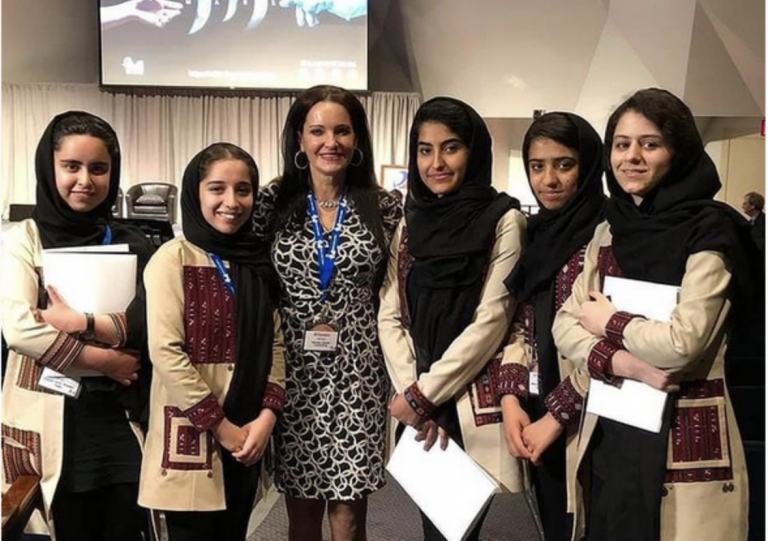Allyson Reneau, a 60-year-old mother of 11 and grandmother of 8 from Oklahoma, is making headlines for helping 10 girls from Afghanistan escape the country amidst the crisis unraveling in Kabul.
The 10 teenagers are members of the Afghan Girls Robotic Team. They were hailed in the West as the future of Afghanistan. After the Taliban took over the country, there is fear that the insurgent group will shut down education for females. The robotics team was apparently “terrified” for their future.
In an interview with Canadian Broadcasting Corp (CBC), human rights lawyer Kimberly Motley stated that the Taliban was going door to door and “taking girls out,” forcing them to become child brides.
“We are very, very concerned of that happening with this Afghan girls robotics team – these girls that want to be engineers, they want to be in the AI community and they dare to dream to succeed,” Motley said. She added that the girls were “literally begging” the Canadian government and Prime Minister Justin Trudeau to allow them entry into Canada.
Reneau had met the girls, who are between 16 and 18 years of age, back in 2019 at the Humans to Mars summit in Washington while they were in America for a robotics competition. Over the years, she kept in touch with them. As it became clear that the Taliban would take over Afghanistan, Reneau became concerned for the teenagers. She “couldn’t shake” the feeling that they would soon be in danger.
Success
You are now signed up for our newsletter
Success
Check your email to complete sign up
Reneau first called Republican Senator Jim Inhofe for help. However, the senator was busy dealing with the issues of American citizens trapped in Afghanistan. So, Reneau took a flight to Qatar on Aug. 9. “I remembered my former roommate in D.C. a couple of years ago was transferred to Qatar… She said she worked in the U.S. Embassy in Qatar… she was sure her boss would approve helping the girls,” Reneau said to NBC.
Together, Reneau and her former roommate finished the necessary paperwork. The Qatar government sent a plane to Afghanistan and flew the girls out. The teenagers are reportedly in a secure location in the United States and will soon be able to pursue higher education.
According to Elizabeth Schaeffer Brown, a board member on the Digital Citizen Fund (DCF), the parent organization of the girls’ team, she and the DCF founder had been working with Qatar since the beginning of August when it became clear that Taliban would come into power.
“The flight out of Kabul was only at the very end of a journey in which safety was always a concern… Ultimately the girls ‘rescued’ themselves. If it were not for their hard work and courage to pursue an education, which brought them in contact with the world, they would still be trapped. We need to continue to support them and others like them,” Brown said.
No country for women
In an Instagram post, Reneau stated that she was receiving “heartbreaking messages” from many women in Afghanistan. Educated females are apparently being “fired from their jobs and are in hiding.” The post contained a screenshot of messages from an Afghan woman who requested Reneau for help to flee the country. The woman said that the Taliban “looks at us” as an enemy. Reneau is currently working to get 25 more Afghan girls from the robotics team to safety.
Though the Taliban has announced that it would ensure women’s rights are protected under the regime, not many trust such statements. “There’s already a level of fear of not being able to go to the street, of not being able to go to university tomorrow, of not being able to go to work next week, next year,” Inna Michaeli, director of programs at the Association for Women’s Rights in Development, said to NBC News.
In an interview with CNBC, Brookings Institution researcher Vanda Felbab-Brown said that there is “no chance” that the current freedoms for women existing in Afghanistan will be preserved under Taliban rule.
“Are we going to end up in the most horrible situation — the way the Taliban ruled … in the 1990s? Or are we looking at freedoms and restrictions, perhaps similar to something like Saudi Arabia or Iran… We are clearly looking at a significant reduction in political, social freedoms for all actors — not just women, but particularly for women,” Felbab-Brown said.
Heather Barr, interim co-director of the Women’s Rights Division at Human Rights Watch, stated in an August 17 article that there is a “major disconnect” between what the Taliban says to the media and what happens in reality. She pointed out that the Taliban’s local commanders have shut down girls’ schools in recent months. Though the Taliban spokesman has pledged to respect women’s rights, “his claims ring more hollow than ever,” the article said.
Reneau’s 11 children include nine daughters.

















